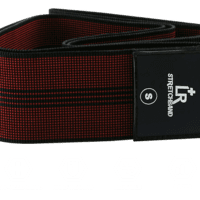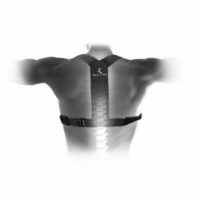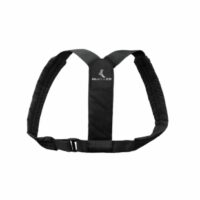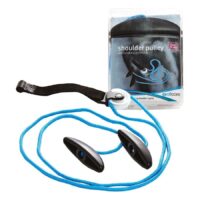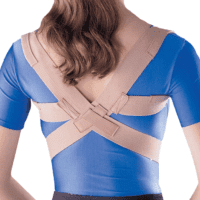Swimmers Shoulder
Article by Zoe Russell

Swimmers Shoulder
What is Swimmers Shoulder?
Swimmer’s Shoulder is a common condition affecting swimmers of all levels, characterised by pain and discomfort in the shoulder. This term encompasses various injuries arising from the sport’s repetitive and intensive nature.
Shoulder Anatomy and Physiology in Swimming
The shoulder, a complex joint, plays a crucial role in swimming. Understanding its anatomy helps in identifying and treating related injuries. Swimmers often experience stress on muscles and ligaments, leading to conditions like Swimmer’s Shoulder.
Causes and Risk Factors
Overuse, incorrect swimming techniques, and muscle imbalances are primary causes of Swimmer’s Shoulder. Recognising these factors is essential for effective treatment and prevention.
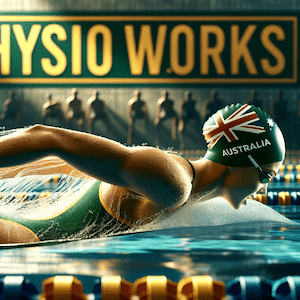
The Role of Physiotherapy
Physiotherapy is vital in managing Swimmers Shoulder, offering a proactive approach to prevent the condition from escalating. Early intervention by a physiotherapist is key, as it can significantly reduce the duration and intensity of the condition. Treatment usually involves a suite of exercises customised to strengthen and balance the shoulder muscles, thereby enhancing swimming mechanics. These exercises are not just about building strength; they also focus on improving flexibility and endurance of the shoulder muscles, crucial for swimmers.
Physiotherapists utilise a range of techniques for effective recovery. Manual therapy, for instance, involves hands-on techniques to mobilise joints, reduce pain, and improve circulation in the shoulder area. Furthermore, specific rehabilitation exercises are designed to target the muscles most affected by swimming, ensuring a focused and effective recovery.
An essential aspect of physiotherapy is education. Physiotherapists play a critical role in informing swimmers about proper swimming techniques and preventive practices. This includes advice on stroke modification, training schedules, and lifestyle changes that can reduce the risk of developing Swimmers Shoulder. By understanding and applying these principles, swimmers can continue to enjoy their sport while minimising the risk of injury.
Prevention and Treatment Strategies
Preventive measures are crucial in avoiding the development of Swimmers Shoulder. These include proper training regimens that emphasise technique and balance, rather than just endurance and strength. Maintaining balanced shoulder muscles is essential; this means focusing on both the primary muscles used in swimming and their supporting muscles to ensure overall shoulder stability.
Correcting stroke techniques is another significant aspect of prevention. This may involve working with a coach to tweak certain aspects of the swimming stroke to reduce strain on the shoulder. For those already experiencing shoulder issues, treatment strategies involve a period of rest to allow the inflamed tissues to heal, coupled with targeted physiotherapy. This approach not only addresses the immediate pain but also works towards long-term shoulder health.
Rehabilitation and Recovery Process
The rehabilitation process for Swimmers Shoulder is multi-faceted and tailored to each individual’s specific needs. It starts with setting realistic recovery goals – understanding that healing takes time and patience is key. The process includes a variety of exercises and recovery techniques, each designed to target different aspects of shoulder health. These exercises focus on gradually building strength, improving flexibility, and restoring normal shoulder function.
An important part of the recovery process is understanding and managing the psychological aspects of injury. Dealing with pain and the frustration of not being able to swim at full capacity can be challenging. Physiotherapists often provide support and guidance in this area, helping swimmers to stay motivated and positive throughout their recovery journey.
Success stories of swimmers who have recovered from Swimmers Shoulder with the help of physiotherapy are numerous. These stories serve as a testament to the effectiveness of a well-planned rehabilitation program. They also highlight the importance of adhering to the prescribed exercises and treatment plans, showing that with commitment and the right guidance, full recovery is achievable.
Conclusion
In conclusion, the role of physiotherapy in managing Swimmers Shoulder cannot be overstated. With a focus on prevention, tailored treatment strategies, and a comprehensive rehabilitation process, physiotherapy offers swimmers the best chance at a full recovery and the ability to return to the sport they love.
Rochedale - Call 38410277
Book Online: RochedaleSalisbury - Call 32751044
Book Online: SalisburySandgate - Call 32691122
Book Online: SandgateRelated Articles
- Common Swimming Injuries – Discover a range of injuries common among swimmers, highlighting causes, symptoms, and preventive tips.
- Shoulder Pain – Explore detailed information on various shoulder pain causes, treatment options, and preventive measures.
- Rotator Cuff Injuries – Gain insights into rotator cuff injuries, a frequent issue for swimmers, including diagnosis, treatment, and recovery.
- Shoulder Impingement – Learn about shoulder impingement syndrome, its impact on swimmers, and effective treatment strategies.
- Shoulder Instability – Find out about shoulder instability, common risks for swimmers, and how to manage these conditions.
- Strength Training for Swimmers – Get information on strength training exercises tailored for swimmers to support shoulder health and prevent injuries.
- Flexibility Exercises for Swimmers – Explore flexibility exercises that can help prevent shoulder injuries and enhance swimming performance.
- Swimming Recovery Techniques – Learn about recovery techniques that are crucial for swimmers in managing shoulder stress and preventing injuries.






